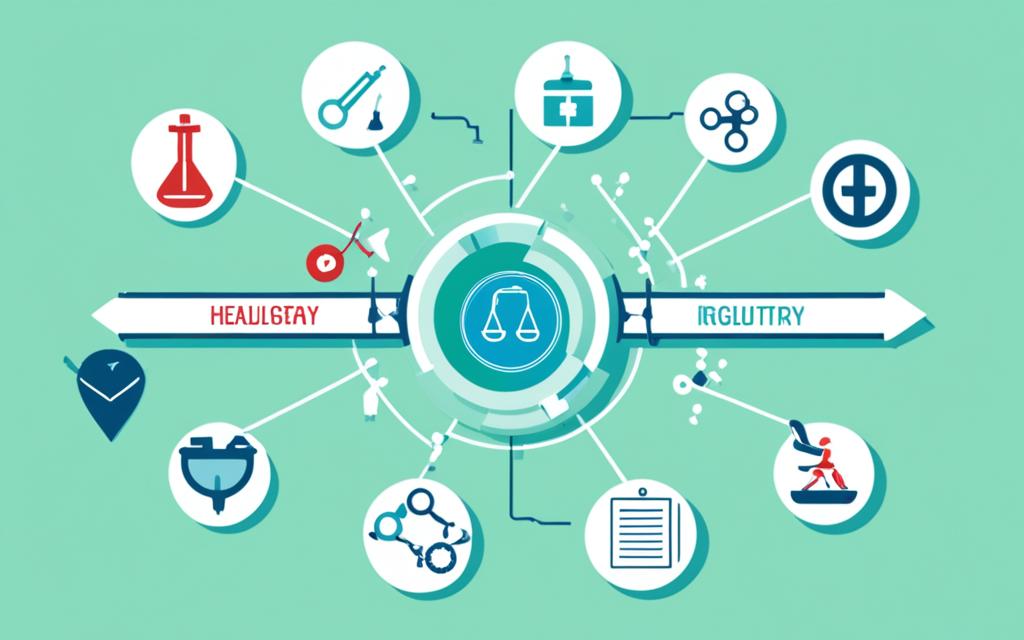The healthcare industry is highly regulated, with a complex set of laws and regulations that healthcare organizations and providers must adhere to. These regulations are designed to protect patient privacy, ensure quality care, and prevent fraud. Understanding the legal environment of healthcare is crucial for navigating the industry and maintaining compliance. This article will explore the key regulations, compliance requirements, and legal aspects of the healthcare sector.
Key Takeaways
- The healthcare industry is highly regulated, with a complex set of laws and regulations governing patient privacy, quality care, and fraud prevention.
- Understanding the legal environment of healthcare is crucial for navigating the industry and maintaining compliance.
- This article will explore the key regulations, compliance requirements, and legal aspects of the healthcare sector.
- The healthcare industry must adhere to regulations such as HIPAA, which protects patient privacy, and the Anti-Kickback Statute, which prevents fraud.
- Healthcare lawyers play a vital role in advising on compliance, representing clients in legal disputes, and shaping the development of healthcare regulations.
Introduction to Healthcare Compliance Regulations
Regulatory compliance in healthcare refers to the adherence to the laws, regulations, and guidelines that govern the healthcare industry. These healthcare compliance regulations are in place to protect patient privacy, ensure quality patient care, and prevent healthcare fraud. The Health Insurance Portability and Accountability Act (HIPAA), passed in 1996, is a key regulation that defines the steps healthcare organizations and professionals must follow when collecting, storing, handling, and sharing patient information.
In addition, the Occupational Safety and Health Act of 1970 was created to ensure safety standards within the healthcare workplace, covering aspects such as handling infectious agents and diseases, x-ray machines, and other safety protocols. Healthcare fraud is a major issue, which is why several laws and organizations have been formed to combat this problem.
What is Regulatory Compliance in Healthcare?
Regulatory compliance in healthcare refers to the adherence to the laws, regulations, and guidelines that govern the healthcare industry. These regulations are designed to protect patient privacy, ensure quality care, and prevent fraud. Healthcare organizations and providers must comply with a complex set of rules and standards to maintain their operations and avoid legal issues.
Ensuring Privacy and Quality Patient Care
Protecting patient privacy is a critical aspect of healthcare compliance. Regulations like HIPAA mandate how healthcare organizations and professionals must handle and secure patient information, ensuring the confidentiality and integrity of sensitive data. Additionally, compliance regulations aim to maintain quality patient care standards, promoting best practices and patient safety throughout the healthcare system.
Protection of Healthcare Workers
The healthcare industry also has regulations in place to protect healthcare workers. The Occupational Safety and Health Act, for example, sets standards for workplace safety, covering issues such as the handling of infectious agents, the use of x-ray machines, and other safety protocols. Maintaining compliance with these regulations helps ensure the well-being and safety of healthcare personnel.
Combating Fraud
Healthcare fraud is a significant issue that compliance regulations aim to address. Laws and organizations have been established to combat fraudulent activities, such as the False Claims Act, the Anti-Kickback Statute, and the Stark Law. Healthcare compliance programs play a crucial role in identifying, investigating, and preventing fraud within the industry.
Characteristics of an Effective Healthcare Compliance Program
Establishing a robust healthcare compliance program is crucial for healthcare organizations to navigate the complex regulatory landscape and ensure adherence to relevant laws and regulations. An effective compliance program encompasses several key characteristics that work in tandem to promote a culture of integrity and accountability.
Designated Compliance Officers and Team
At the heart of a successful healthcare compliance program is a dedicated team of compliance officers who oversee the implementation and monitoring of the program. This team, led by a chief compliance officer, is responsible for developing and enforcing policies, conducting risk assessments, and providing guidance to employees on compliance-related matters.
Employee Education and Training
Ongoing employee education and training are essential for maintaining a healthcare compliance program. Organizations must invest in comprehensive training programs that keep their workforce informed about the latest regulatory standards, ethical practices, and compliance best practices. This ensures that all employees, from frontline staff to executive leadership, are equipped to identify and address potential compliance issues.
Effective Communication and Reporting System
An effective healthcare compliance program fosters open communication and encourages employees to report any suspected compliance violations or concerns. This is typically achieved through the implementation of anonymous hotlines, web-based reporting systems, and clear policies that protect whistleblowers from retaliation.
Disciplinary and Corrective Action Processes
To ensure the effectiveness of a healthcare compliance program, organizations must have well-defined processes for addressing compliance violations. This includes taking appropriate disciplinary action against employees who breach the organization’s code of conduct, as well as implementing corrective actions to remedy any identified issues and prevent similar occurrences in the future.
| Characteristic | Description |
|---|---|
| Designated Compliance Officers and Team | A dedicated team of compliance professionals, led by a chief compliance officer, responsible for developing, implementing, and monitoring the compliance program. |
| Employee Education and Training | Comprehensive training programs that keep employees informed about regulatory standards, ethical practices, and compliance best practices. |
| Effective Communication and Reporting System | Channels for employees to anonymously report suspected compliance violations or concerns, with protections against retaliation. |
| Disciplinary and Corrective Action Processes | Clearly defined procedures for addressing compliance violations, including disciplinary action and corrective measures to remedy issues and prevent recurrence. |

Top Challenges in Regulatory Compliance in Healthcare
The healthcare industry faces a multitude of challenges when it comes to maintaining regulatory compliance. From ensuring robust cybersecurity measures to navigating the complexities of telemedicine, healthcare organizations must stay vigilant in order to protect patient data and deliver quality care while adhering to the ever-evolving legal landscape.
Ensuring Cybersecurity at All Levels
Healthcare organizations that collect, store, and manage sensitive patient information are prime targets for cybersecurity threats. Implementing robust security protocols, regularly updating systems, and educating employees on best practices are crucial to safeguarding against data breaches and other cyber attacks that can compromise healthcare compliance and patient trust.
The Advent of Telemedicine
The rapid growth of telemedicine services has presented new compliance challenges for the healthcare industry. As regulations surrounding telehealth continue to evolve, healthcare providers must navigate a complex web of requirements related to patient privacy, data security, and the delivery of remote care to ensure they remain healthcare compliance compliant.
Acquiring and Retaining Talent
Building a knowledgeable and experienced team of compliance professionals is crucial for healthcare organizations navigating the intricate regulatory landscape. Acquiring and retaining top talent requires implementation of in-depth, yet ethically compliant, screening processes to identify candidates capable of understanding and applying the latest healthcare compliance standards.
https://www.youtube.com/watch?v=BDx0oWL_DCE
Tips to Stay on Top of Healthcare Regulations
To remain compliant with the ever-evolving healthcare regulations, experts recommend that healthcare organizations invest in dedicated administrative roles responsible for developing and maintaining robust regulatory programs. Adopting an agile and innovative approach is crucial in this rapidly changing landscape.
Continuous staff training and education are also essential for successful compliance and ensuring high-quality patient care. As new technologies emerge and risks evolve, healthcare organizations must remain vigilant and adaptable to meet the latest regulatory changes and stay compliant with healthcare regulations.
| Key Strategies for Staying Compliant | Benefits |
|---|---|
| Designate Compliance Officers and Team | Ensures dedicated resources to monitor and implement compliance initiatives |
| Provide Continuous Employee Training | Keeps staff informed of current regulations and best practices |
| Maintain Agile and Innovative Approach | Enables the organization to adapt quickly to regulatory changes |
| Establish Effective Communication and Reporting System | Facilitates the identification and resolution of compliance issues |
By investing in the right people, processes, and technologies, healthcare organizations can stay ahead of the curve and ensure they are staying compliant with healthcare regulations at all times.

Timeline of Significant Healthcare Regulations
The healthcare industry has witnessed the enactment of numerous significant regulations over the years, each aimed at protecting patient data, ensuring quality care, and combating fraud. These landmark laws and frameworks have played a crucial role in shaping the compliance landscape for healthcare organizations and providers.
HIPAA (Health Insurance Portability and Accountability Act) (1996)
The HIPAA law, passed in 1996, established comprehensive standards for the confidentiality and security of patient information, setting the foundation for healthcare data privacy and security. This landmark legislation has had a lasting impact on the way healthcare organizations manage and protect sensitive patient data.
HITECH Act (2009)
The HITECH Act, enacted in 2009, built upon HIPAA by increasing penalties for data breaches and promoting the widespread adoption of electronic health records (EHRs). This legislation aimed to modernize healthcare technology and improve the interoperability and accessibility of patient information.
21st Century Cures Act (2016)
The 21st Century Cures Act, passed in 2016, was designed to accelerate the pace of scientific innovation, alleviate administrative burdens, and enhance data sharing and privacy protections in the healthcare industry. This multi-faceted legislation has played a significant role in shaping the future of healthcare technology and regulation.
GDPR (General Data Protection Regulation) (2018) (EU)
The EU’s GDPR, implemented in 2018, set strict rules on data protection and patient rights, directly impacting healthcare organizations that handle the personal data of European Union citizens. This landmark regulation has raised the bar for data privacy and security practices across the global healthcare landscape.
CCPA (California Consumer Privacy Act) (2020) (California)
Closer to home, the California Consumer Privacy Act (CCPA), enacted in 2020, granted California residents new rights over their personal information, including the ability to access, delete, and opt-out of the sale of their data. This state-level legislation has influenced healthcare compliance efforts across the United States.
HITRUST CSF (Health Information Trust Alliance Common Security Framework)
The HITRUST CSF, a comprehensive security framework, has become a widely adopted standard in the healthcare industry. By aligning with HITRUST CSF, healthcare organizations can demonstrate their commitment to protecting sensitive patient information and maintaining robust cybersecurity practices.
Information Blocking Rule (2021)
The Information Blocking Rule, implemented in 2021, aims to promote the free flow of electronic health information, enabling patients to access their medical data and empowering healthcare providers to share information more seamlessly. This regulation is a significant step forward in enhancing healthcare data interoperability and patient empowerment.
Interoperability and Patient Access Final Rule (2021)
Complementing the Information Blocking Rule, the Interoperability and Patient Access Final Rule, also introduced in 2021, requires healthcare providers and payers to make patient data more accessible and sharable, further advancing the goal of improved healthcare data interoperability and patient engagement.
Legal Aspects of Healthcare
Health law is a multidisciplinary field that focuses on the regulations and policies governing the healthcare industry and healthcare itself in government and private settings. This area of law affects legal issues related to medical providers, health insurers, patients, and government agencies, addressing a wide range of topics such as medical malpractice, Medicare, Medicaid, HIPAA, and estate planning.
Understanding Health Law and Its Significance
Health care lawyers play a crucial role in the industry, providing legal advice and representation to a variety of clients, including healthcare providers, hospitals, insurance companies, and government agencies. They assist with regulatory compliance, medical malpractice claims, insurance disputes, and fraud allegations, among other legal matters.
Key Components of Health Care Law
Health law directly impacts both healthcare providers and patients, setting standards for care, protecting patient rights, and ensuring access to quality health services. Government agencies, such as the Department of Health and Human Services and the Centers for Medicare and Medicaid Services, also rely on health care lawyers to develop, implement, and enforce regulations that govern the healthcare industry.
The Role of Health Care Lawyers in the Health Care Industry
Health care lawyers play a crucial role in the industry, providing legal advice and representation to a variety of clients, including healthcare providers, hospitals, insurance companies, and government agencies. They assist with regulatory compliance, medical malpractice claims, insurance disputes, and fraud allegations, among other legal matters.
Navigating Medical Malpractice and Health Insurance Issues
Health law directly impacts both healthcare providers and patients, setting standards for care, protecting patient rights, and ensuring access to quality health services. Health care lawyers assist with regulatory compliance, medical malpractice claims, and insurance disputes, among other legal matters.
How Health Law Affects Health Care Providers and Patients
Health law directly impacts both healthcare providers and patients, setting standards for care, protecting patient rights, and ensuring access to quality health services.
The Importance of Health Law for Government Agencies and Regulations
Government agencies, such as the Department of Health and Human Services and the Centers for Medicare and Medicaid Services, rely on health care lawyers to develop, implement, and enforce regulations that govern the healthcare industry.

Becoming a Health Care Lawyer
Aspiring healthcare lawyers must first complete law school and pass the LSAT exam. Many law schools now offer specialized healthcare law programs that provide additional training and resources for those interested in this field, including internships, clinical experiences, and networking opportunities. These programs equip future lawyers with the knowledge and skills needed to navigate the complex legal landscape of the healthcare industry.
The Path to Becoming a Health Care Lawyer: Law School and Beyond
Once licensed, healthcare lawyers can work in a variety of settings, such as law firms, federal agencies, and as in-house counsel for hospitals or insurance companies. Their expertise is invaluable in helping healthcare organizations stay compliant with the ever-changing regulations and laws governing the industry.
Health Care Organizations and Compliance with Health Laws
Healthcare organizations, including hospitals, nursing homes, and medical practices, must comply with a complex array of laws and regulations. Healthcare lawyers play a crucial role in assisting these organizations by drafting and reviewing contracts, advising on regulatory compliance, and representing them in legal disputes. Their deep understanding of the healthcare legal landscape helps ensure that these organizations maintain ethical and lawful practices while providing quality care to their patients.
Health Care Fraud and Abuse
Healthcare fraud and abuse are significant concerns in the healthcare industry, costing taxpayers billions of dollars each year. Healthcare lawyers play a crucial role in combating this issue by representing clients in enforcement actions and advising on compliance with relevant laws, such as the False Claims Act, the Anti-Kickback Statute, and the Stark Law.
Enforcement and Legal Aspects
These healthcare attorneys assist with internal investigations, provide guidance on developing and implementing compliance programs, and represent clients accused of violating these fraud and abuse laws. By navigating the complex legal landscape, they help healthcare organizations and providers maintain compliance, protect patient rights, and ensure the integrity of the healthcare system.

Conclusion
The legal environment of healthcare is complex and ever-evolving, with a multitude of healthcare regulations and laws governing the industry. Understanding these regulations, from HIPAA to the Stark Law, and maintaining healthcare compliance is essential for healthcare organizations and providers to ensure patient privacy, quality care, and the prevention of fraud. Healthcare lawyers play a vital role in navigating this healthcare legal environment, advising clients on compliance, representing them in legal disputes, and shaping the development of healthcare regulations.
As the healthcare industry continues to transform, the importance of healthcare law will only continue to grow, making it a critical field for ensuring the integrity and success of the healthcare system. By staying up-to-date with the latest regulations and best practices, healthcare organizations can navigate the complex legal landscape and provide the highest quality care to their patients.
Ultimately, the legal environment of healthcare is a constantly evolving landscape that requires diligence, expertise, and a commitment to compliance. By working closely with healthcare lawyers and maintaining a strong compliance program, healthcare organizations can ensure they are meeting their legal obligations and delivering the best possible care to their patients.
FAQ
What is regulatory compliance in healthcare?
What are the key characteristics of an effective healthcare compliance program?
What are some of the top challenges in regulatory compliance in healthcare?
What are some of the significant healthcare regulations that have been enacted over the years?
What is the role of healthcare lawyers in the industry?
How can one become a healthcare lawyer?
What is the legal environment surrounding healthcare fraud and abuse?
Source Links
- https://www.healthcarecompliancepros.com/blog/what-is-regulatory-compliance-in-healthcare
- https://www.apu.apus.edu/area-of-study/security-and-global-studies/resources/what-is-health-law/
- https://bigid.com/blog/8-healthcare-compliance-regulations-you-should-know/

